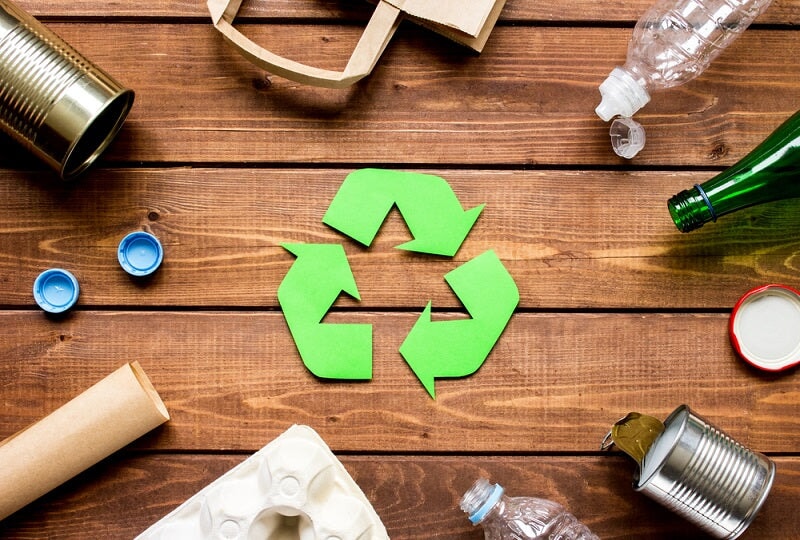
TLDR
From curbing greenhouse gasses to reducing the burden on landfills, the myriad benefits of recycling are widely known.1 They’re also the driving force behind our decision to toss our aluminum cans into the recycling bin and reuse that Ziploc bag until its very (and sometimes bitter) end.
As aware as we might consider ourselves, recycling rates are plummeting. Reuters reports that recycling plastic materials dropped by 5% in 2021,2 and the latest data from the Environmental Protection Agency (EPA) reports that the recycling rate fell to 32.1% in 2018.3
What’s stopping people? In this post, we’ll unpack why recycling efforts have declined just when they are needed the most—and why we should be fiercely recycling.
7 Reasons Why People Don’t Recycle
As a society, people have come a long way in working together to build a stronger, better tomorrow. And we’re still continuing to make strides. From shifting to green energy to power our houses to choosing more vegetables over beef, we’ve certainly become more conscious of the small steps we can make to show some love to our planet.
Still, we’re missing the mark when it comes to recycling. Here’s why:
- Confusion about what to recycle (and how)
- Inconvenience and a lack of access to recycling
- A shortage of time
- Lack of space to accommodate recyclables
- People simply forgetting to recycle
- A lack of trust in recycling programs
- No legal ramifications
Let’s dive into each reason.
#1 Confusion About What to Recycle (and How)
One of the biggest things that keep people from recycling isn’t necessarily a flagrant dismissal of the practice. It’s because they’re confused about what can be recycled, like can you compost paper towels, and how to do it.
A survey conducted in 2019 found that 50% of Americans are confused about recycling. Some of the most common items they’re confused about include:
- Used pizza boxes
- Plastic utensils
- Ink cartridges
- Plastic bags
(Here’s a quick hint: The last two items in the above list can be recycled!)
This has led some people to commit to what’s been called “aspirational recycling,” or throwing things they hope are recyclable into a recycling bin. This is admirable, to be sure, but it also contaminates recyclables and contributes to the waste crisis.
And yet, 61% of respondents claim that they’re concerned about the health of the ocean and 82% want to be more environmentally friendly.

#2 Inconvenience and a Lack of Access to Recycling
Some of us may be fortunate enough to live in an area with ample recycling opportunities, including curbside bins and a nearby recycling facilities we can make a quick stop at on a Saturday morning.
Others? Not so much.
Inconvenience and a lack of access to recycling are two of the most prevalent reasons why people don’t recycle.5
There is no federal oversight on recycling programs, which means that one town might be flush with recycling opportunities and another not at all. A lack of recycling options is the most ubiquitous in rural and low-income areas.6
This problem has only become exacerbated since China ceased accepting recycled materials in 2018 to stymie pollution, which has prompted cities across the U.S. to put an end to their recycling programs.7
Florida, Pennsylvania, and Tennessee are just a handful of states which, in the absence of a recycling program, began sending their recyclable materials to landfills. Overall, this has led to a decline in curbside recycling pickups and the closures of recycling centers.
#3 A Shortage of Time
Time also factors into the equation of why people aren’t recycling plastic as much as they should. In a survey conducted by Ipso Public Affairs, 10% of the respondents claimed they didn’t regularly recycle because it was time-consuming.5 This entails taking time to:
- Separate regular trash from common household rubbish
- Washing out jars and containers
- Flattening cardboard boxes
- Locating—and driving to—a recycling drop-off
Some experts speculate this is caused by the fact that while people know recycling is good (if not vital) for the environment, people don’t see the immediate results of it.5
#4 Lack of Space to Accommodate Recyclables
The idea of letting recyclables stack up or squeezing a receptacle bin underneath our already-crowded sinks doesn’t exactly sound like the chic interior design look.6 Yet, the benefits of recycling—detailed below—beat the cost of finding a nook for recyclables.
#5 Forgetting to Recycle
While recycling is second nature to many, and despite it being one of the most effortless ways people can work towards protecting the environment and reducing their carbon footprint, 10% of people who responded to the Ipso survey asserted they don’t recycle often simply because they forget to do so.5
#6 A Shortage of Trust in Recycling Programs
A global survey conducted by the World Economic Forum, Qualtrics, and SAP found that people fail to recycle because of a lack of trust in recycling programs.7 Articles abound across the media stating that plastic recycling is a scam. While much of this might be sheer internet noise, there’s some merit to the concern:
- After China’s 2018 ban, and without a demand for recyclable materials, some recycling plants have been forced to send their stockpiles to landfills.8
- Recycling has grown increasingly expensive since China’s ban.9 This has caused some to question if it’s worth it. (The answer to this is a resounding yes.)
Further, 1% of respondents to that Ipso survey we discussed above said they don’t understand the environmental benefits of recycling, and it’s challenging to have faith in a program when there’s no clear understanding of its advantages.5

#7 There are Few Legal Ramifications for Not Recycling
Some cities, such as San Francisco and Seattle, impose penalties on apartment buildings, restaurants, and offices that don’t follow recycling protocols and recycle a few of the most common materials:10
- Cardboard
- Plastic trash
- Glass
- Aluminum
Mandates, though, are rare. And decisions about recycling are made at the local level. Overall, there’s no legal incentive to recycle. Littering, meanwhile, is a criminal offense in several states—and roadside litter has decreased by 54% since 2009.11
The Top 5 Reasons Why People Should Recycle
There are barriers to recycling, but they can be overcome easily. Like all positive habits and behaviors, they take time to develop. Moreover, the reasons why we should prioritize recycling far outweigh the hindrances.
#1 Reduces Pollution and Helps Offset Climate Change
Materials that aren’t recycled content–but can be–end up in one of two places. They’re either:
- Incinerated, which releases toxins into the environment that can contribute to climate change and harm human health12
- In a landfill, which is the third largest source of methane emissions
Methane contributes heavily to global warming by keeping heat trapped in our atmosphere, which will happen if we don’t recycle.
#2 Curbs Deforestation
Whether it’s pages from a discarded notebook or a reused paper towel, recycling paper cuts down on the need for turning to our forests for wood.
Not recycling, however, results in deforestation, which has severe consequences, including:
- Poor air quality
- Reductions in biodiversity
- Climate change
- Greater food insecurity
- Displacement of communities

#3 Leads to More Jobs
Recycling and reuse programs keep people employed and boost the economy and individual economic security. In fact, recycling accounts for the following:1
- 681,000 jobs per year
- $37.8 billion in wages annually
To put this in a different perspective, incinerating 10,000 tons of waste creates (or sustains) a single job. Recycling, however? For the same amount, you can create 36 jobs.13
#4 Conserves Energy
When we don’t have recyclables to call upon for new materials, we need to turn to raw materials, and the manufacturing of them comes with a high price tag, energy-wise.
Recycling, on the other hand, saves an impressive amount of energy:13
- 95% less energy is required to recycle aluminum than to produce aluminum from raw material
- 60% less energy is needed to create steel
- Recycled newspaper saves 40% of production energy
- Recycled plastics saves 70% in energy, and
- Recycled glass requires 40% less energy
This adds up—especially once we take into consideration that our energy use is at a premium.
#5 Protects Wildlife
Recyclable materials that aren’t disposed of properly may leak out into the environment and pose threats to our wildlife, from plastic soda rings getting caught around a cat’s neck to a sea turtle choking on a piece of cardboard.14
The recycling process may take an extra minute, but in doing so, it could save an animal’s life, and participating in events like National Recycling Day can push society in the right direction.
Join the Recycling Crusade with Reel Paper
The recycling rate is declining, which means the reason to fight for our planet by doing your part is increasing. Reel Paper makes it that much easier to recycle on a regular basis.
Our Bamboo Toilet Paper and Bamboo Paper Towels are constructed from tree-free fibers, with no plastic packaging. We even offer our toilet paper in bulk, which cuts down the amount of packaging needed per product. In short, you can turn to single-use paper products with a clean conscience (and stay clean at the same time).
Explore our line of products today. Tomorrow’s generation will thank you.
Sources:
- US EPA. Recycling basics. https://www.epa.gov/recycle/recycling-basics
- Reuters. U.S. plastic recycling rate drops to 5%. https://www.reuters.com/world/us/us-plastic-recycling-rate-drops-close-5-report-2022-05-04/
- US EPA. National overview: facts and figures on materials, wastes and recycling. https://www.epa.gov/facts-and-figures-about-materials-waste-and-recycling/national-overview-facts-and-figures-materials
- New York Post. More than half of Americans are confused about recycling.4 https://nypost.com/2019/04/16/more-than-half-of-americans-are-confused-about-recycling/
- HuffPost Life. The psychology behind why people don’t recycle. https://www.huffpost.com/entry/psychology-of-why-people-dont-recycle_n_57697a7be4b087b70be605b3
- Waste Advantage Magazine. Why Americans aren’t recycling. https://wasteadvantagemag.com/why-americans-arent-recycling/
- World Economic Forum. Survey reveals why people don’t recycle anymore. https://www.weforum.org/agenda/2021/11/barriers-to-recycling-sustainability-survey/
- The Huffington Post. The dirty truth is your recycling may actually go to landfill.s https://www.huffpost.com/entry/america-china-recycling-crisis-landfills_n_5b5170b1e4b0de86f48b7740
- WBGH. The cost of recycling hits budgets in Massachusetts cities and towns. https://www.wgbh.org/news/local-news/2020/03/09/the-cost-of-recycling-hits-budgets-in-massachusetts-cities-and-towns
- Vox. Us cities are canceling recycling programs. https://www.vox.com/the-goods/2019/3/18/18271470/us-cities-stop-recycling-china-ban-on-recycles
- Keep America Beautiful. Keep America Beautiful releases largest study on litter in America. https://kab.org/keep-america-beautiful-releases-largest-study-on-litter-in-america
- Scientific American. Burning trash is bad for humans and global warming. https://www.scientificamerican.com/article/burning-trash-bad-for-humans-and-global-warming/
- NIH. Environmental programs benefits of recycling. https://nems.nih.gov/environmental-programs/pages/benefits-of-recycling.aspx
- PETA. How littering kills animals. https://www.peta.org/features/litter-kills-animals/
- Forbes. Why is it so hard to recycle? https://www.forbes.com/sites/blakemorgan/2021/04/21/why-is-it-so-hard-to-recycle/?sh=39b55ab23b77




0 comments